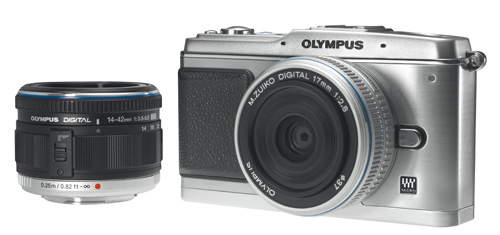The Olympus Pen EP1 uses the new Micro 4/3rds camera standard designed by Olympus & Panasonic which aims to offer a physical camera size similar to a compact camera with better image quality and SLR-like versatility because it can use interchangeable lenses.

When Olympus lent me their PEN EP1 digital camera for review my first thoughts were “finally an innovative design and it actually looks like a real old school camera” . However when taking photos with it I was constantly frustrated by small design flaws.
This makes the camera quite hard to review.
People who buy with their heart and appreciate design aesthetics will say it has a great retro look, be wowed at how small and light it is compared to a traditional bulky SLR and insist that Olympus should be praised for taking a big risk in creating such an innovative camera body design.
Other people who are more logical like me will think it’s pretty expensive, the auto focus is frustratingly slow and the kit 14-42mm lens (28-84mm equiv) zoom lense has a clumsy manual lock/unlock mechanism.
I wouldn’t buy one but plenty of other people will buy the EP1 (as well as its recently announced successor the EP2) and the very fact that it exists will hopefully give Canon, Nikon and the other dominant SLR manufacturers a kick up the pants to encourage them to also innovate rather than just releasing slightly improved variations on their last model every 6 months.
Photos Taken With Olympus PEN EP1
Walking in Sydney – Surry Hills and China Town
Other People’s Reviews
{{camera-photo}}
Olympus is taunting tigers at the zoo with its new digital “Pen” camera, the E-P1. The “tigers” in this case are the self-appointed camera snobs, who will undoubtedly maul this bold, retro-styled shooter for not being expensive enough, powerful enough or big enough to qualify as a “real” camera.
But the ambitious consumers at whom it’s aimed will have a hard time understanding this strange new device’s appeal without first hearing a 10-minute lecture about sensor size, interchangeable lens mount standards, optical viewfinders and high ISO speeds.
The resulting camera is beautiful, fun to use, yet not entirely practical. It’s pricey too. As a result, it probably won’t become a massive bestseller, but that’s beside the point. What it will do is win design awards, turn heads, and kick-start camera makers to put a little more thought into their designs, rather than mindlessly churning out variations on the same tired theme year after year.
– WIRED
Our advice to anybody wanting a simple point and shoot model who is seduced by the E-P1’s obvious charms should tread carefully – and here’s why. Firstly it simply doesn’t work anywhere near as well as a decent compact in social situations; the focus is painfully slow in low light, especially with the zoom (which is slower – in aperture terms – than most compacts), and even if you fork out for the flash you’ll find getting quick shots indoors at night frustratingly difficult.
Secondly the output when using the full auto mode with either kit lens isn’t going to look that different from a good compact when used outdoors in good light, meaning you’re carrying a lot of extra weight for little gain. Finally the sheer number of options and controls and features will leave many novices scratching their heads in confusion. That all said, if you do want to learn about photography this is certainly a camera that will pay dividends to anyone prepared to invest the time and effort involved in mastering it.
– DP Review
The E-P1 is a reasonable initial effort. There are no fatal flaws in it, just a lot of small things that irritate. As an aperture-priority, single focus, never-dip-into-the-advanced-features daily shooter, the E-P1 makes a good choice. But it could be far better, and that frustrates me when I see that in a design
Thom Hogan

Leave a Reply